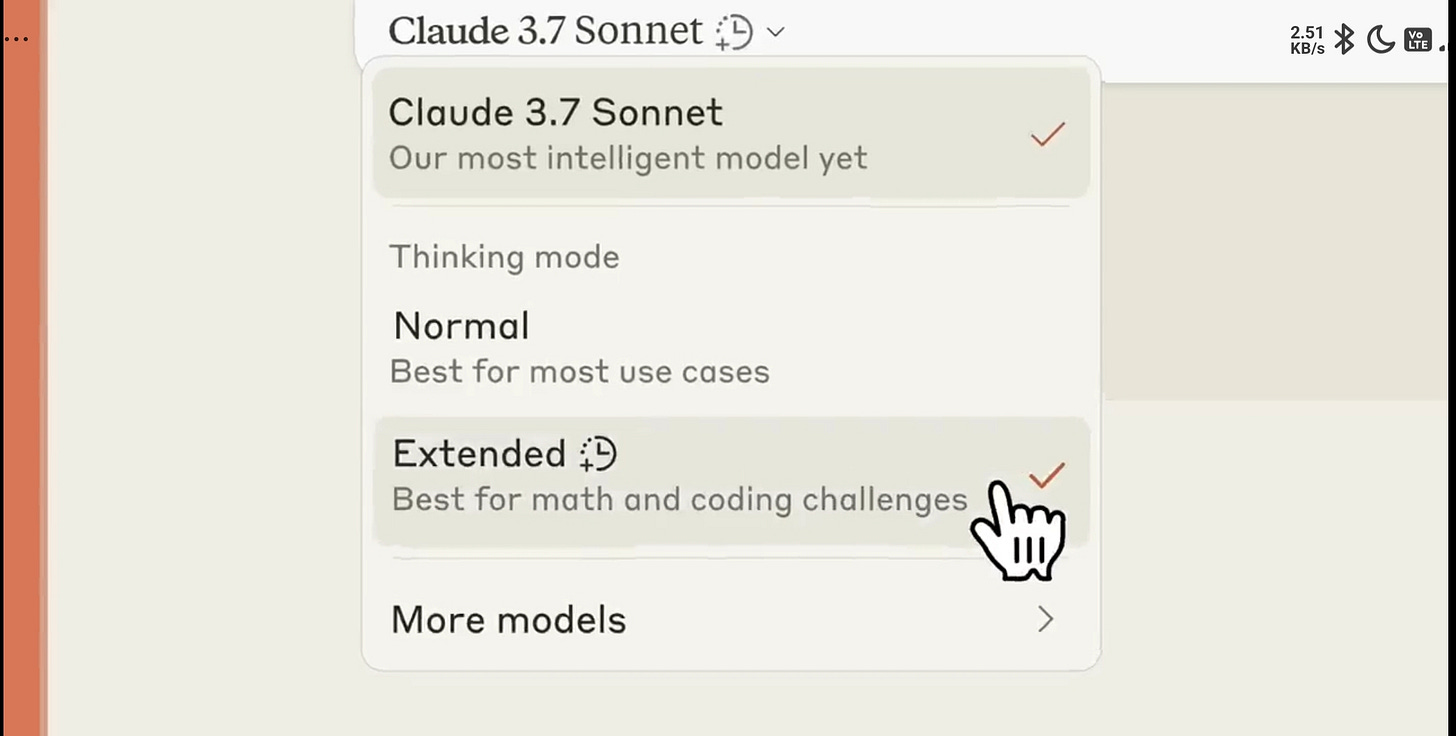Claude 3.7 Sonnet: When Your AI Thinks Like a Senior Dev
Hybrid Reasoning, 70.3% SWE-bench, and Why Coders Should Care.
Another day, another AI model drop 🤷♂️
These past weeks, we’ve seen DeepSeek R1, OpenAI’s o3-mini, and Grok 3—but one heavyweight stayed quiet. Until now.
Boom 💥 Anthropic just played their ace: Claude 3.7 Sonnet, a hybrid reasoning model boasting 70.3% on SWE-bench and agentic coding superpowers.
Is this the ‘four of a kind’ devs need, or just more AI hype?
Let’s dissect its claims, compare it to our favorite Cursor, and see if it’s worth your tokens.
So, What's All the Fuss About?
The first hybrid reasoning model on the market. Claude 3.7 Sonnet is considered the most intelligent model to date.
But what does this really mean?
The Secret Sauce🥫: Two Modes, One AI
Standard Mode: For when you need quick answers, like asking the LLM for questions during your next sightseeing in Portugal (LLMs are amazing and 10h my experiences on vacation as funny as it sounds ✌️😆).
Extended Thinking Mode: For when you need deep, methodical thinking – like making some software architecture decisions or you are researching some papers from uni..
Today, we’re announcing Claude 3.7 Sonnet1, our most intelligent model to date and the first hybrid reasoning model on the market. Claude 3.7 Sonnet can produce near-instant responses or extended, step-by-step thinking that is made visible to the user. API users also have fine-grained control over how long the model can think for.
Why Cursor 3.7 Sonnet Is A Game Changer For Coders?
The Anthropic team have developed the reasoning models with the goal to optimize more for real-world tasks that better reflect how business actually use LLMs, in stead of focusing on math, CS competition problems and so on.. that’s a major approach difference compared to competitors

Claud 3.7 Sonnet scored an impressive 70.3% on SWE-bench Verified, outperforming competitors
Claude Code can "search, edit, test, and even push code to GitHub”
The extended thinking mode allows for deeper problem-solving on complex coding tasks, with visible step-by-step reasoning
Enhanced "action scaling" enables better interaction with virtual computing environments
Anthropic employees have used it to "create front-end website designs, develop interactive games, and even engage in coding tasks for up to 45 minutes"
As Anthropic states, Claude 3.7 Sonnet is "state-of-the-art for agentic coding, and can complete tasks across the entire software development lifecycle".
Claude Code Vs. Cursor
So far, 2025 has been the year of both SR models (like R1 and o3) and agentic AI tools (like OpenAI's Operator and Deep Research). Not to be left out, Anthropic has announced its first agentic tool, Claude Code.
It's a command-line tool that can search, edit, test, and even push code to GitHub
It's powered by Claude 3.7 Sonnet, Anthropic's latest and greatest AI model
It's designed to handle substantial engineering tasks right from your terminal
This one can be a big competitor to AI powered IDEs like Cursor, but it is not yet a real threat to them. Let me explain why 👇
Since Claude Code is in “limited research preview" some folks can’t reallly access it
Cursor is very familiar to all of us as it is an extension of VSCode. Meaning it also leverages the VSCode’s extension library
Claude Code is terminal-based :)
Cursor allows you to see changes in your dev server before accepting them
and probably the most important one I found from other people’s comparison research:
It’s cheaper 💰 to use Claude 3.7 Sonnet via Cursor than Claude Code, as crazy as it may sound at first. Check out this video to learn more:
Some PROs & CONs
What's Hot:
Claude 3.7 Sonnet can produce responses up to 128,000 tokens long - 15 times longer than its predecessor—with 64,000 output tokens enabled by default. Longer responses are particularly effective for rich code and content generation.
We can also control the budget for thinking. What this means is we can tell Claude to think for no more than N tokens, for any value of N up to its output limit of 128K tokens. This allows us to trade off speed (and cost) for quality of answer.
In the extended mode, we can actually see the LLM’s thought process.
What's Not:
The thinking comes with a bigger cost. Of course, thinking requires more computational power, which is more expensive by default.
Mastering when to use which mode might take some practice.
Sometimes, you just don’t need as complex and costly reasoning for a task. Opt for the core standard model as often as possible.
The Bottom Line
Claude 3.7 Sonnet: Smart Enough to Code, Priced to Make You Think 💰
I will be experimenting and using Claude 3.7 Sonnet for my coding tasks and see how it goes. As per the buzz and Anthropic engineers, it should be the best at it.
The ability to switch between quick answers and deep thinking is really cool and I plan to take full advantage of it. That said I will use it with Cursor ✌️
What do you think of Claude 3.7 Sonnet? Let me know 👇
I really love the blog-posts and content that Anthropic makes. They are really pushing it in terms of helping people understand the LLMs, tools and leverage them properly!
For more content like this, do consider becoming a subscriber & like the post to help me grow! 💙









